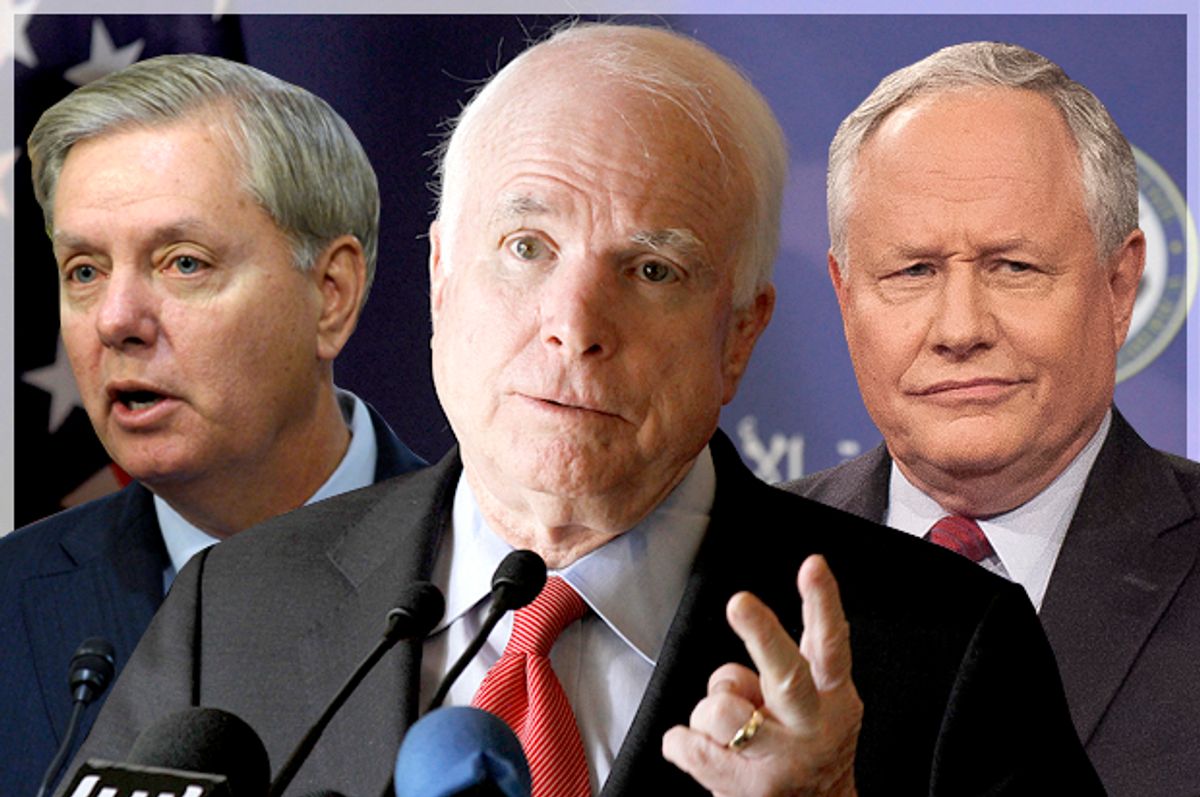Amid all the hot gaffes and lies and outlier polls here at home, that thing over in the Middle East that everyone got all worked up a month or two ago -- bombing ISIS in two countries -- is still happening. ISIS, itself, is still happening, and has yet to be "destroyed," because what does that even mean. It's only been a couple of months, of course, and even the White House admitted upfront that this would be a long-term military effort. The problem is people don't like "long-term." They want a button to be pushed and ISIS, both the people and the thousand-year political strife that gives rise to it, to be gone with a flip of the switch, like the trash disposal in the sink.
That might mean that the public is gradually coming around to the idea of deploying their neighbors' sons' boots to the ground. A new NBC/WSJ poll shows that "forty-one percent of respondents believe both troops on the ground and airstrikes are necessary for the mission against ISIS, versus 35 percent who think it should be restricted to airstrikes." In September, NBC/WSJ showed 40 percent for airstrikes only and 34 percent for airstrikes and neighbors' sons on the ground.
Or is it more like neighbors' grandsons?
The seven-point increase in those also wanting U.S. ground troops has been fueled mostly by groups that make up the GOP base. More self-described Republicans (up 14 points), men over 50 years old (up 18), white men (up 17) and seniors (up 10) now advocate for troops on the ground in the fight against the terror group. There’s been virtually no change since September among Democrats, young people, and white women.
Older men who want to send younger men to fight on the ground hold a lot of power in the military and diplomatic corps, is the thing. (Older men, in general, hold a lot of sway in America.) And, according to Washington Post columnist David Ignatius, they're arguing their case for escalation before the White House right now. Their recommendations include speeding up and amplifying the process of training and bombing that's already underway. And then there's this:
Finally and most painfully, authorize U.S. advisers to join the “assault echelon” when Iraqis go into battle against the extremists. This will be the hardest recommendation for Obama to accept, because it fuzzes his pledge not to use combat troops in Iraq. But one official says putting U.S. advisers “in harm’s way” will be crucial in stiffening Iraqi resolve. Dempsey said Sunday that the “decisive” battles for Mosul and other extremist strongholds “will require a different kind of advising and assisting” from what Obama initially advocated.
President Obama has pledged not to deploy "boots on the ground" in this struggle against ISIS. By which we're talking combat troops, fighting on the front lines. A smattering of intelligence officials, spotters, and those assisting with training are fine. But sending troops in harm's way to assist with (/do all of) the fighting would be a whole other thing, a real escalation, and one that President Obama has pledged he'll never do.
Do you trust him? What if the military commanders and various other important old people get him to change his mind? Right now, under the legal rationale the White House has been using, the only thing between no ground combat troops and lots of ground combat troops is the president's judgment. Or, even more frighteningly, President Ted Cruz's judgment in 2017. Or, not-unfrighteningly, President Hillary Clinton's judgment in 2017.
It's time for Congress to codify this thing -- what is and what is not allowed. Preferably right now, but that's not going to happen, because members of Congress are busy running their dumb campaigns. So, in the lame-duck. With all the authority resting in the president's hands, it's easy for all other non-stakeholders (everyone else) to talk up escalation and score points off of the unpopular president. The president is more susceptible to pressure from military commanders. He is on his own.
The rules have to be set, straitjackets applied. Will combat troops be allowed or will they not? In the status quo, they will be allowed, and no one besides the president is on the hook.

Shares